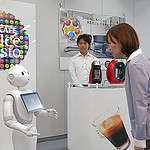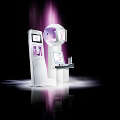
For decades, science fiction books have depicted futuristic worlds peopled with robots, and now reality is catching up with fiction. Recently, the Japanese subsidiary of the Nestlé group announced the deployment of 1,000 robots in its stores.
Named Pepper, these humanoid robots are designed to advise the clientele about the different products sold by the brand. Using the sales questions usually asked by sales assistants, they can hold a real conversation with the consumer. They orientate their questions, listen, then analyse the client's replies, reactions and visible emotions to guide them to a specific product. In the case of Nestlé, "Pepper" explains the characteristics of coffee machines in the Nescafé Dolce Gusto and Nescafé Gold Blend Barista ranges as well as those of associated products. The robot also presents the delivery, guarantee and sales conditions.
Having received all the information for their choice, all the consumer has to do it to ask for the reference from the human sales assistants, present in the stores. In a press release, the Nestlé Japan Company states that it wants to equip 20 of its stores before December, then all its sales points before the end of 2015.
Developed by the French company, Aldebaran, the Pepper robot took its first steps at the reception desks of SoftBank Mobile stores - the Japanese mobile phone operator - but the manufacturer has other projects for him. The company states on its site that "the stores are just the beginning" and that its aim is to "create robots for the well-being of humans, kind robots living with humans as a new artificial species". With a facial, vocal and emotional recognition system, this humanoid remembers users and constantly learns.
In the robotic sector, Aldebaran is not the only company to raise the issues linked to employment and the place of robots in companies. Recently, the company, Momentum Machine, announced the sale of its BurgerBot, a mini robotised production chain capable of making up to 360 burgers an hour, that could put thousands of employees in fast food restaurants out of a job.
*Photos from the Nestlé Japan Flickr page
News in the same category
A baby has only one way of communicating his or her needs: crying. The "Cry Translator" application and baby phone from Biloop takes care of translating them for young, despairing parents.
Specialised in beauty diagnostics using skin measurements, the cosmetic brand, Ioma, will soon launch a new concept. Ioma Factory will let you create a customised day and night cream, from your beauty diagnosis.
As well as being a simple carrier bag, the "Rag Bag" becomes an envelope to send old clothes to charities. This initiative by the ready-to-wear brand, Uniforms for the Dedicated also has an ecological aim.
In the race to conquer the tablet and smartphone market, anything goes. Microsoft has openly mocked competitors Samsung and Apple in its new advertisements and buys American iPads in return for vouchers.




